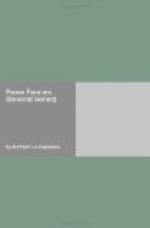In a dictionary of a date (1856) when everything on earth and in heaven was settled and written in penny cyclopaedias and books of deportment, I find these delicious definitions—
Manly: becoming a man; firm; brave; undaunted; dignified; noble; stately; not boyish or womanish.
Womanly: becoming a woman; feminine; as womanly behaviour.
Under Woman we find the adjectives—soft, mild, pitiful and flexible, kind, civil, obliging, humane, tender, timorous, modest.
Who can doubt that the dictionary maker defined and distributed his adjectives aright for the year 1856? Since then, however, many alarming heresies have taken root in our land, and some are heard to declare that both these sets of adjectives apply to men and women alike, and are, in fact, necessities of any decent human outfit. Otherwise the conclusion is obvious, that no one desirous of the adjective ‘manly’ must ever be—soft, mild, pitiful and flexible, kind, civil, obliging, humane, tender, timorous, or modest; and no one desirous of the adjective ‘womanly’ be—firm, brave, undaunted, dignified, noble, or stately.
But surely the essentials of ‘manliness’ and ‘womanliness’ belong to man and woman alike—the externals are purely artistic considerations, and subject to the vagaries of fashion. In art no one would think of allowing fashion any serious artistic opinion. It is usually the art which is out of fashion that is most truly art. Similarly, fashions in manliness or womanliness have nothing to do with real manliness or womanliness. Moreover, the adjectives ‘manly’ or ‘womanly,’ applied to works of art, or the artistic surfaces of men and women, are irrelevant—that is to say, impertinent. You have no right to ask a poem or a picture to look manly or womanly, any more than you have any right to ask a man or a woman to look manly or womanly. There is no such thing as looking manly or womanly. There is looking beautiful or ugly, distinguished or commonplace, individual or insignificant. The one law of externals is beauty in all its various manifestations. To ask the sex of a beautiful person is as absurd as it would be to ask the publisher the sex of a beautiful book. Such questions are for midwives and doctors.
It was once the fashion for heroes to shed tears on the smallest occasion, and it does not appear that they fought the worse for it; some of the firmest, bravest, most undaunted, most dignified, most noble, most stately human beings have been women; as some of the softest, mildest, most pitiful and flexible, most kind, civil, obliging, humane, tender, timorous and modest human beings have been men. Indeed, some of the bravest men that ever trod this planet have worn corsets, and it needs more courage nowadays for a man to wear his hair long than to machine-gun a whole African nation. Moreover, quite the nicest women one knows ride bicycles—in the rational costume.




